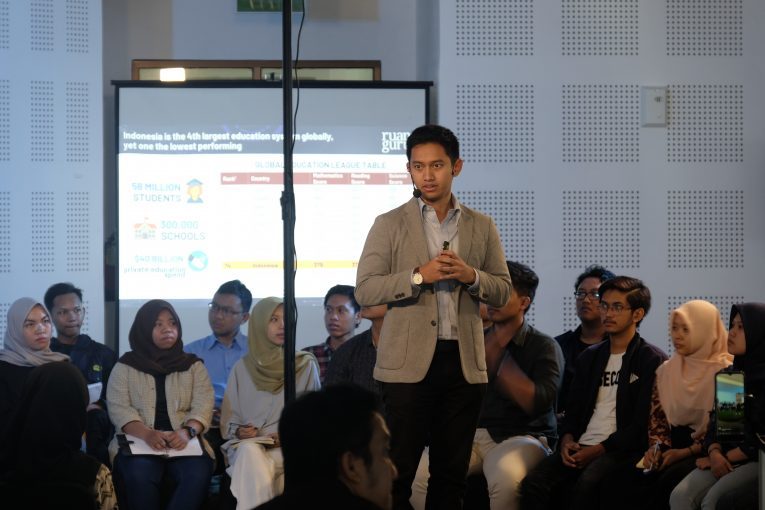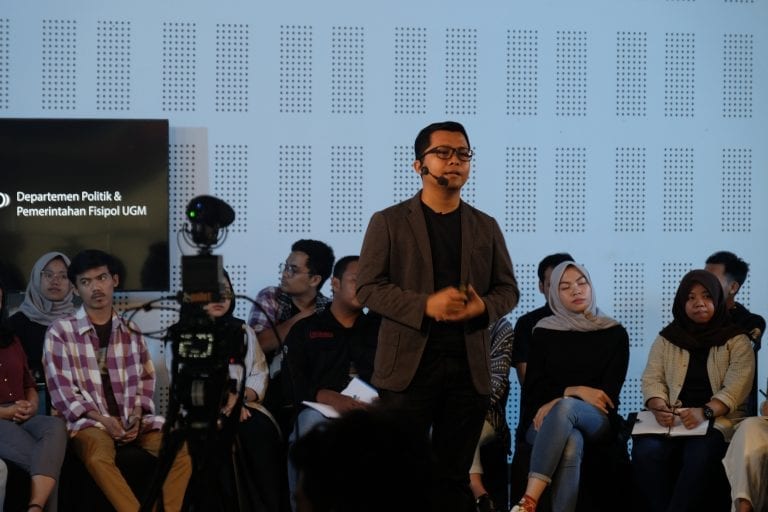
Yogyakarta, 28 February 2020—“If from the beginning, our initial orientation in starting this business was making a huge profit, Ruangguru will not last until now,” Adamas Belva said, the Co-Founder of Ruangguru, in an event called The Third Series of Sociopreneurship Class: Spread the Knowledge to Every Corner, last Friday. Until 2020, the number of users of this biggest education startup in Indonesia has reached 15 millions students.
That event was initiated by the Department of Politics and Government Fisipol UGM and supported by Innovation and Academic Research Center UGM (PIKA UGM). From 13.00 WIB, rows of chairs in the 4th Floor Auditorium Fisipol UGM, the venue of this event, were filled with audiences. Besides Belva, there was also the Founder of Bahaso, Tyovan Ari Widagdo. Ari began to develop this platform where people can learn foreign language online in 2015. To the audiences, Belva and Ari talked about their experiences in starting a business which known by the people as sociopreneurship.

“The main principle of sociopreneurship is spreading the benefits as widely as possible with a very minimal cost, because of that the business will sustain,” Belva said. Belva said that, the original purpose of creating Ruangguru in 2014 was to improve the educational equality in Indonesia. According to Belva, it can be achieved through the use of digital technology. At that point, the young people hold an important role. “In these days, a big company or big startup always based on the digital technology that are dominated, mostly, by young people,” Belva said.
To the audiences, Belva said that Indonesia is still lagging in the field of education. “My professor from Harvard said that, to catch up with the developed countries, Indonesia needs 128 years,” Belva said. According to Deutsche Welle, Indonesia currently ranks at the top five countries with the best educational quality in the ASEAN after Singapore, Brunei Darussalam, Thailand, and Malaysia. That is certainly not a bad number. It is just, we also need to remember that there are only 10 countries in ASEAN.
“And education is the key to get a better life,” Belva added. Meanwhile, to the audiences, Ari explained about the importance of mastering foreign languages in the modern era for Indonesian people. According to Ari, formal education so far only taught foreign languages for the academic achievement. For example, English subject in the school, only demanded the students to achieve a high score.
On the other hand, Ari said that 12 years to learn English from Elementary School to Senior High School is too long. “English is not learned as a communication tool. Therefore there are still many people that take English course after graduating Senior High School,” he added. “With Bahaso, people can learn wherever and whenever they want. They can learn in their bedroom without being shy if they were wrong,” Ari said.
For Ari, mastering foreign language is important for the progress of the society, even a country. By mastering foreign language, a person will be able to survive and has a sale value in the middle of global economic competition. “In a country, a good foreign language mastery by the people could increase the economic growth up to 38%,” Ari explained, Ruangguru and Bahaso are not only companies with detailed profit and loss calculations. But far from that, they both intend to improve the education and human resources of Indonesian people.
